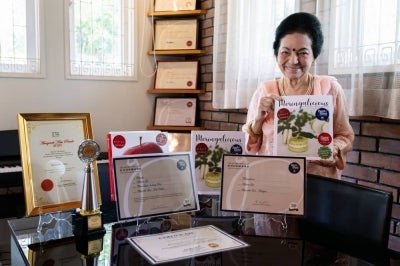Young South Koreans adopt ‘pet rocks’ to cure loneliness, burnout
It provide stress relief and companionship without the typical responsibilities of owning a traditional pet.
SHARIFAH SHAHIRAH
SHAH ALAM – A new trend is emerging in South Korea, where young people are opting to buy stones instead of pets to cure loneliness and burnout.
Pet rocks provide stress relief and companionship without the typical responsibilities of owning a traditional pet like a dog or cat where people purchase rocks and treat them as pets, adorning them with outfits, painted faces, giving them names and even providing them with beds.
Online news portal DesignTAXI the trend gained traction in Korea in 2020 amid the Covid-19 pandemic.
Public figures including K-pop stars and actor showcased their own pet rocks, contributing to its rise in popularity among the public.
This trend gained momentum as these low-maintenance ‘pets’ were sold on websites along with instruction manuals, catering to those seeking companionship.
Many Koreans took to social networks to share photos of their creatively designed pet rocks, showcasing outfits, faces and amusing stickers.
The allure of pet rocks lies in their minimal commitment, offering a source of comfort and companionship that alleviates feelings of isolation without the responsibilities associated with caring for living creatures.
According to another media outlet, The Straits Times, the acclaimed film Parasite, directed by Bong Joon-ho, featured a stone slab in some scenes, featuring one of the main characters receiving a stone from his friend Min-hyuk, allegedly stolen from his grandfather's collection, promising wealth to Ki-woo's family.
The significance of the stone, referred to as 'suseok' or scholar's rock, which holds historical prominence dating back to the Joseon Dynasty, primarily among scholars.
It was believed to possess auspicious qualities, bringing prosperity and sophistication to homes and offices alike.
The culture of collecting rocks experienced a decline in previous decades but saw a resurgence during the Covid-19 pandemic. Presently, the stones being collected are notably smaller, and the motivations for collecting them have undergone significant shifts.
While suseok was traditionally collected as decorative items, contemporary collectors are acquiring stones, often referred to as ‘pet stones,' as companions to alleviate loneliness.
Park Sung-won, a 36-year-old residing in Seoul recalled his grandparents displaying several scholar's rocks on their shelves.
“Some of them had eye-catching shapes and colours. I also recall them being carefully displayed along with expansive orchids,” he said.
Individuals who own pet stones often attribute human-like qualities to them.
Commenting on the topic of pet rocks, a 29-year-old woman who wanted to be known as Lim revealed to the news outlet that she acquired her pet stone during the pandemic to provide companionship while working remotely.
“I just wanted to have something by my side while I was working remotely. It provided me a sense of companionship.
“I would occasionally pick my stone up from its bed and pat it. I sometimes just talked to it as if I was talking to myself,” she was reported as saying.
Another pet rock owner, Park, a 31-year-old woman from Seoul, highlighted one of the benefits of having pet stones—they do not require the same level of attention as traditional pets.
“I cannot raise cats or dogs because I have to work. I like having pet stones because I don’t have to worry about feeding or walking them.”
It further said that although pet stones may not yet be the most popular hobby, there is a growing demand for them, according to an online seller.
They are also more affordable compared to traditional pets or suseok, ranging from 6,000 won (S$6) to 10,000 won.
“We sell about 300 pet stones a month. Our main customers are women who are in their 20s and 30s,” the owner said.
According to experts, elaborated on the article that the psychology on pet stone culture reflects societal fragmentation, wherein connections within society are absent or underdeveloped, leading to the grouping of certain members.
The article in touch with Seoul National University Consumer Trend Centre research fellow Jeon Mi-Young said that some participants in her workshops use the act of painting on stones to refresh their minds.
“I have seen that many younger people who growingly feel stressed about maintaining relationships tend to easily walk away from their relationships and turn to other measures to deal with loneliness,”
“If collecting action figures is a way to satisfy one’s taste, those people who collect stones seem to focus more on their relationship with their stones,” she said.
While raising a pet stone may align with Asia’s popular tradition of collecting stones, such as Korea’s suseok, Japan’s suiseki, and China’s gongshi, the motive behind it represents something new.
This resurgence is intertwined with the increasing prevalence of single-person households, reflecting a broader societal shift toward solitary living arrangements.
Download Sinar Daily application.Click Here!














